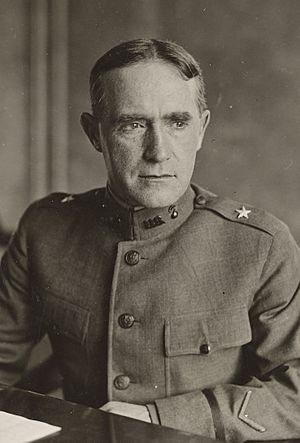George Washington Burr facts for kids
Quick facts for kids
George Washington Burr Jr.
|
|
|---|---|

Brigadier General G.W. Burr in 1918
|
|
| Born | December 3, 1865 Tolono, Illinois |
| Died | March 4, 1923 (aged 57) Washington, D.C. |
| Buried | |
| Allegiance | |
| Service/ |
|
| Years of service | 1885–1922 |
| Rank | |
| Service number | 0-66 |
| Awards | Distinguished Service Medal Companion of the Order of the Bath |
George Washington Burr Jr. (1865–1923) was an important American general. He served in the United States Army and played a key role during World War I.
Contents
Early Life of George Burr
George Washington Burr Jr. was born on December 3, 1865. His parents, George and Nancy Burr, lived in Tolono, Illinois.
Military Career and Service
Joining the Army
George W. Burr attended the West Point military school. He finished his studies and graduated in 1888. After graduating, he became an officer in the 1st artillery unit.
Later, he taught military science and tactics. He worked at the Agricultural and Mechanical College of Mississippi until 1893.
Working with Ordnance
Burr then joined the Ordnance Department. This department is in charge of weapons, ammunition, and military equipment. In April 1899, he was promoted to the rank of captain.
He helped develop new ammunition at the Rock Island Arsenal. This is a large factory where military equipment is made. In 1910, he became a lieutenant colonel and took command of the arsenal.
World War I Efforts
When the United States joined World War I, the Rock Island Arsenal grew a lot. The number of workers increased from 2,500 to 13,000 people. This showed how important the arsenal was for the war effort.
In 1918, Burr went to England as part of the American Expeditionary Forces. His job was to buy war supplies. He also studied how the British produced their military equipment.
Post-War Leadership
In March 1919, Burr was promoted to major general. He took over from George Washington Goethals as the Assistant Chief of Staff. This role meant he was in charge of buying, storing, and moving supplies for the army.
In 1920, he asked to be relieved from this position. The War Department then sent him back to England. He negotiated an agreement to settle money claims between the U.S. and British governments. This agreement was called the "Burr-Niemeyer Agreement."
Awards and Recognition
For his excellent service during World War I, George W. Burr received a special award. He was given the Army Distinguished Service Medal. This medal honors soldiers who show great service to the government.
Death and Legacy
General Burr passed away on March 4, 1923. He was still working as an Assistant to the Chief of Ordnance in Washington, D.C. He is buried at Arlington National Cemetery.
 | DeHart Hubbard |
 | Wilma Rudolph |
 | Jesse Owens |
 | Jackie Joyner-Kersee |
 | Major Taylor |

